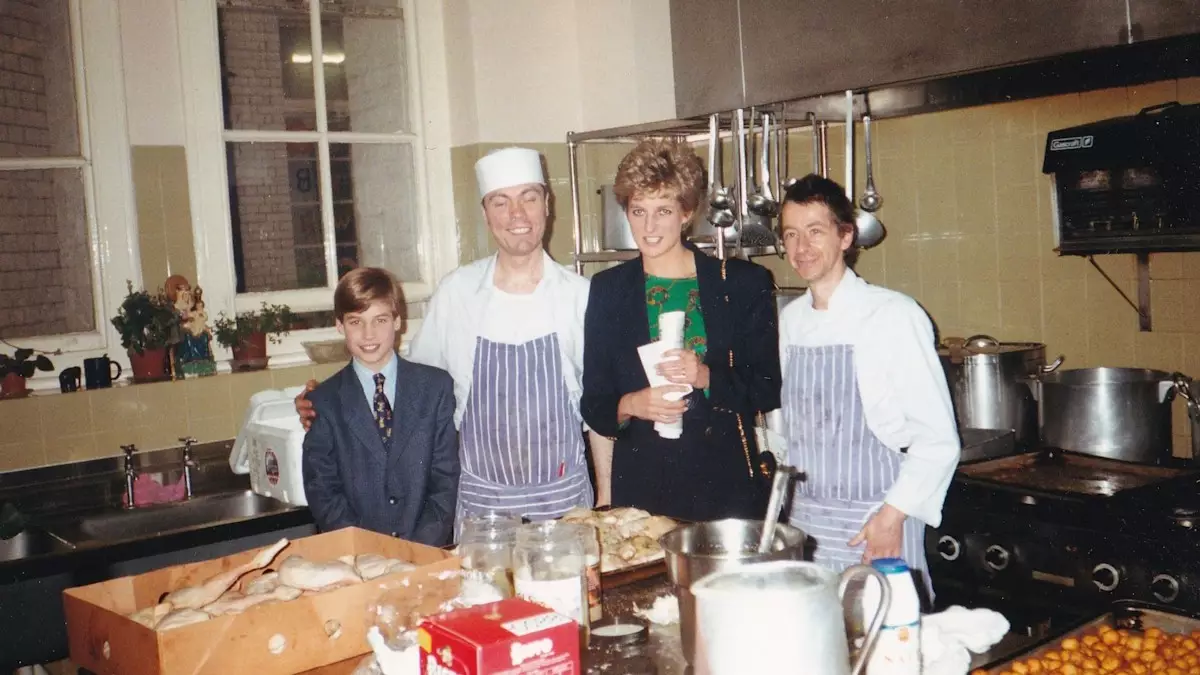Recently released photographs from Kensington Palace offer a poignant glimpse into a young Prince William’s early exposure to social issues, specifically homelessness, during visits alongside his mother, Princess Diana. Captured in 1993, these images depict a ten-year-old William engaging with residents at The Passage, a homeless shelter in London. Flash forward six months, and we find William, now 11, continuing this legacy of empathy, deep imprinted by his mother’s teachings. These snapshots serve as a powerful reminder of the fond yet profound influence Diana had on his development—even at a young age.
In reflecting on these moments during his upcoming documentary, “Prince William: We Can End Homelessness,” airing on ITV and ITVX, William articulates how those early encounters shaped both his perspective and his parenting philosophy. Understanding homelessness is not merely a political issue to him; it embraces empathy and human connection, something he ardently shares with his own children. The future King draws parallels between his discussions with Prince George, Princess Charlotte, and Prince Louis to those he had with Diana. “When you’re small, you’re just curious,” he recollects. Such reflections echo the deep-rooted significance of education and awareness at a young age—a vital component in dismantling the stigma surrounding homelessness.
The heir to the throne experienced an emotional turning point when he lost his mother in a tragic car accident in 1997. Yet, he has kept her lessons alive in his heart and actions. “My mother took me to The Passage,” he reminisces, illustrating the innocence of a boy thrust into a complex social issue: “I was a bit anxious as to what to expect.” Diana’s approach—infusing humor and warmth into challenging situations—profoundly shaped William’s understanding of humanity. His candid realization, “There are other people out there who don’t have the same life as you do,” signifies a notable awakening; it highlights the importance of grounding one’s worldview in compassion and awareness.
William acknowledges how these formative experiences instilled a sense of responsibility in him. Inspired by his mother’s kindness, he seeks to leverage his position for tangible change, stating, “There has to be a better way than just accepting that homelessness is there.” The clarity and resolve in his voice demonstrate an earnest commitment to addressing homelessness head-on—a mission that stands as both an homage to Diana and a beacon of hope for those affected.
This past June, William launched Homewards—a groundbreaking five-year campaign designed to radically transform the way society addresses homelessness. The initiative emerges from years of personal reflection and gives a call to action that seeks to make homelessness “rare, brief, and unrepeated.” Through collaborative teamwork with organizations across various UK cities, the campaign has set ambitious goals that aim to generate genuine change.
When asked about his mother’s likely reaction to Homewards, William chuckled, admitting she might have expressed skepticism initially. Yet, the underlying truth rings clear: his mother set the groundwork for a legacy that influences systemic change. “My mother introduced me to homelessness a long time ago,” he says, emphasizing the importance of emotional connection. This sentiment serves as the crux of his mission—a mission that harnesses not only the King’s influence but also his empathy, ultimately sparking a movement that challenges the acceptability of homelessness.
The Human Element: Bridging Gaps
In a revealing two-part documentary, William’s open engagement with experts, individuals who have experienced homelessness, and various organizations solidifies his dedication to understanding the issue from all angles. His commitment is tangible when he states, “At some point, you’ve got to put your hand in your pocket.” By intertwining practical initiatives such as social housing developments on his own land, William illustrates a hands-on approach that transcends mere royal philanthropy.
For people like Dr. Sabrina Cohen Hatton, a Homewards advocate with a history of homelessness, there’s both admiration and understanding. “He’s really genuinely committed to helping,” she states, underscoring how his life experiences foster a deeper connection to the cause. In this endeavor, one can see a modern monarch stepping away from a life of privilege, aiming to bridge societal divides through meaningful dialogue and incremental change.
Prince William’s documentary not only showcases his evolution as a person who has witnessed first-hand the effects of homelessness but also serves as a call to action for viewers. Over 350,000 people currently navigate the harsh realities of living without a permanent home in Britain—a matter of human rights, dignity, and systemic failure. As he channels his inner Diana, William embodies a future where compassion, awareness, and community initiative offer a glimmer of hope in overcoming one of society’s most pressing issues. As he rallies individuals to take part in this dialogue, it resonates: real change stems from genuine compassion and unyielding resolve. Embracing this philosophy, the legacy of compassion that Diana instilled remains alive and redoubles its intent in the heart of her son.

